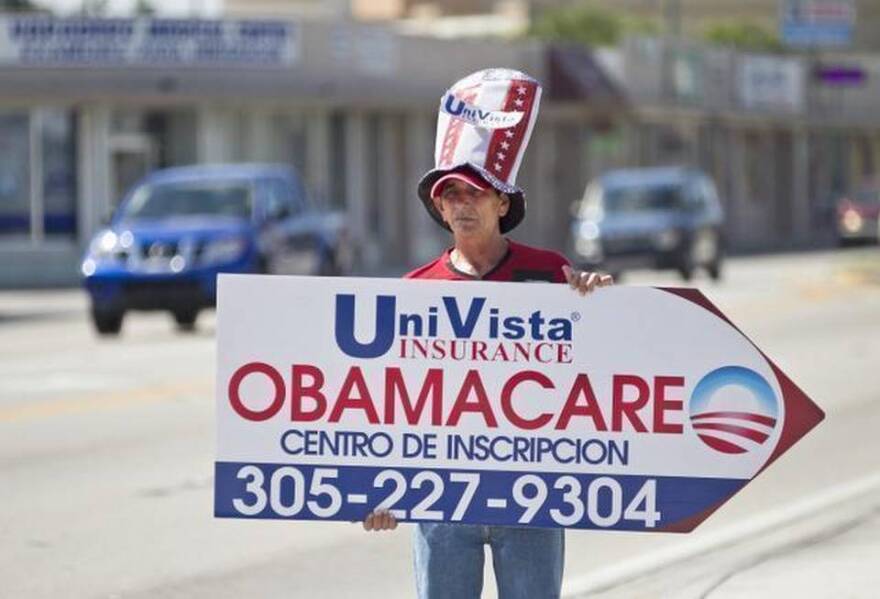President Joe Biden signed a relief package — the American Rescue Plan Act — into law last year that made Obamacare premium tax credits (PTCs) bigger and made more people qualify for those based on their income.
When you enroll in an Obamacare marketplace plan, you can have the credit paid to your insurance company to make that monthly plan cheaper. Or, you can get a credit back when you file your tax return for the year.
Research from the Urban Institute and the Robert Wood Johnson Foundation suggests that if Congress lets these credits expire, states with the largest losses would include Florida, Georgia, and Texas — states that did not expand Medicaid eligibility under the Affordable Care Act and that had large growth in enrollment for health plans on the Obamacare marketplace for 2022 with the enhanced PTCs.
WLRN spoke to Kathy Hempstead, senior policy adviser at the Robert Wood Johnson Foundation, about the impact in Florida if PTCs were to not get extended.
WLRN: Help us understand how the American Rescue Plan Act – the relief package – helped get more people in Florida and across the U.S. insured?
KATHY HEMPSTEAD: So it expanded eligibility, but it also enhanced the tax credits for the whole range of the population. So everybody saw their subsidies increase and their premiums decrease.
The reforms in the American Rescue Plan Act were really significant for customers in the marketplace because they expanded eligibility so that people with incomes above 400% of poverty were now eligible for some subsidies – where previously that was kind of a cliff, where if you made more than 400% of poverty, you just had to pay the full price, and many people found it unaffordable.
And to clarify, a person making 400% of the federal poverty level in 2022 is earning $54,360 a year. So under the American Rescue Plan Act, people who make more than that may be able to get tax credits for purchasing plans on the Obamacare marketplace, but this will continue into next year only if Congress extends the credits.
Certainly a lot of people will benefit from these tax credits if they are extended. All around the country, plans are filing their rates for next year. Seems like a long time from now, but actually this happens in sort of spring, early summer, throughout the country. And right now they’re sort of forced to assume that the rate structure that they had this year and the tax credits that were here this year maybe are not gonna be here next year. We’re gonna sort of go backwards when we really made some nice gains in the marketplace and covered a lot of people.
What does this mean for Florida, which has not expanded Medicaid eligibility under the Affordable Care Act – and that’s the health care law we call Obamacare?
Florida is a huge marketplace state. I mean, you're right that Florida hasn’t expanded Medicaid, which means that your uninsurance rate in Florida is certainly higher than it needs to be. Florida has embraced the marketplace really enthusiastically and there will be like a half a million increase in the number of uninsured Floridians, which is a big deal. So from like 2 million to 2.5 million uninsured people, which is an increase in your uninsured population of about 25%.
A lot of people fell out of regular routines of getting care during the pandemic. So there are gonna be, I'm sorry to say, more people with later-stage cancer diagnoses or different things that were missed because they didn't have preventive care, and then you have an increase in your uninsured population – it’s not trivial. So that's more pressure on your hospitals, your providers, your clinics. It kind of ripples throughout the state and it does affect everybody.
What’s at stake if Congress doesn’t extend this funding? How does this affect everybody?
KATHY HEMPSTEAD: In the individual market, if you think about selection, if premiums are really high, then people that don't have a lot of health needs will maybe say, 'You know, I'm not going to sign up.' So who's who's more likely to stay in and sign up? It's people that are sicker, that have more health needs. And when you think about any kind of insurance market, you sort of pooling risks. And if you create a situation where coverage is so unaffordable that only really sick people want to be in it, you're going to then raise premiums and you're going to make that situation a little bit worse every year because every year premiums will get higher. So it's bad for individuals and it's bad for the market as a whole when premiums go up. And when premiums go up in the health care market, one of the consequences is that you you lose people who need health care less in the moment and will say, I'll pass on that.
Editor's note: This interview has been edited for clarity.
Copyright 2022 WLRN 91.3 FM. To see more, visit WLRN 91.3 FM.

